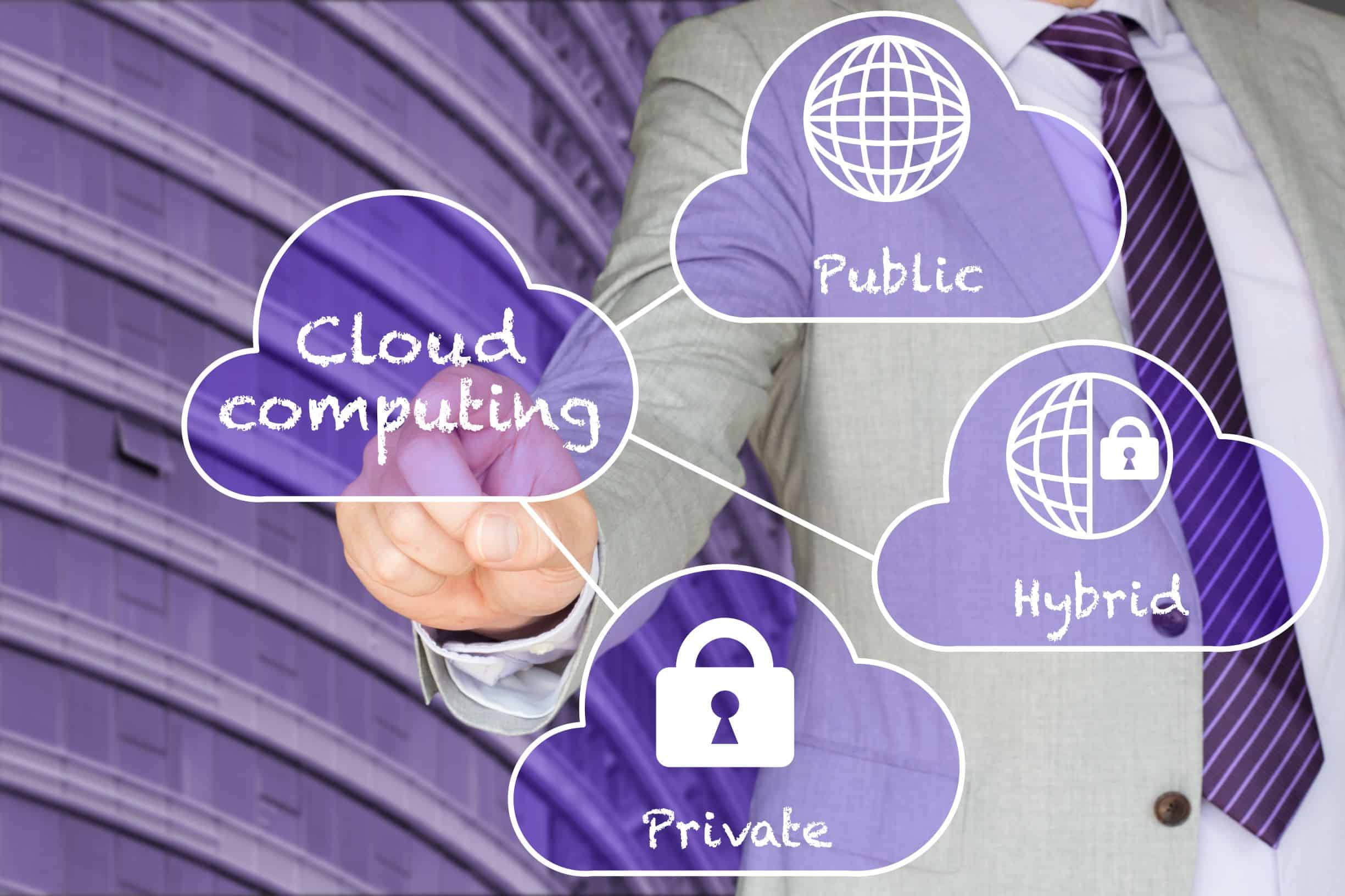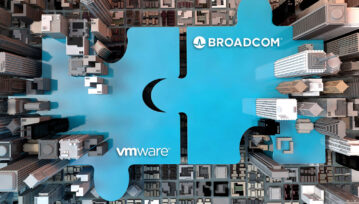Public Cloud, Private Cloud, Hybrid Cloud, and On-Prem…..What’s the Difference?
Connectria
Author
Date
May 24, 2019

Whether your business is planning a cloud migration from a legacy platform or you’re setting up a new cloud system, you’ll hear a lot of industry jargon and tech-speak tossed around. Some of the details are better left to your IT team or your managed service provider, but any savvy business owner or stakeholder will want to understand cloud systems components.
With the right knowledge, you can work together with your managed cloud service provider to make the right choice for your business’s infrastructure.
If cloud computing isn’t your forte, let us break down the key differences and help you determine your best option(s) with tips and insights below.
Public Cloud
What Is Public Cloud?
With a public cloud computing system, service providers make data and resources available to the general public via the internet. This might include data storage, apps, web-based email, databases, or virtual machines. Depending on the service provider, these resources may be free, or they might be available as a pay-per-use model. https://connectriast:09d52015@connectriast.wpengine.com/blog/key-business-benefits-of-the-public-cloud/
Public Cloud Pros
There are businesses across every sector that use public cloud services because of the many benefits. The public cloud is:
- An excellent option for organizations that need scalable solutions that will vary based on user and data demand.
- A practical solution for businesses who don’t have the budget to create and maintain on-premises IT systems or costly hardware. Low costs are one of the greatest advantages of public cloud systems because you are only required to pay for what you use. For many businesses, this pay-as-you-go option makes the most sense from a financial standpoint.
Public Cloud Cons
When it comes to using a public cloud, there are some drawbacks as well:
- Publicly shared systems may lack the customization options that you’d see with one that has been tailored specifically for your business.
- Despite efforts to maintain strict security and because of the shared nature of public cloud services, some organizations prefer to keep their data separate in a private system, which may be more secure in protecting against third-party hackers who are looking to gain access to private information.
Private Cloud
What Is Private Cloud?
A business can forgo public cloud services and create its own proprietary cloud for its organization. A private cloud computing model doesn’t share resources the way a public cloud system does. Instead, your business owns and maintains all cloud capabilities in-house.
Private Cloud Pros
Some of the biggest reasons driving businesses to private cloud computing lie in these benefits:
- A private cloud system is fully flexible and customizable, so businesses can tailor it to meet their exact specifications without having to share functionality or control with others.
- Private clouds are believed to be the most secure because businesses have direct control over network access and who is given authorization. Staggering your levels of security clearance adds an extra set of checks and balances against risks. This is especially relevant for businesses that place compliance and regulation at the forefront, such as healthcare industries.
Private Cloud Cons
Private clouds come with some cons too, with these among them:
- Private cloud systems are also scalable, but this can come at a high cost, depending on the infrastructure. Businesses may have to pay to restructure systems that don’t allow for company growth or fluctuations.
- Private cloud solutions are a more expensive option, as they’re custom-designed specifically for your business. They also require hardware and storage of that hardware, (either on-site or at a vendor data center) all of which comes from your company’s pocket.
- Businesses with private cloud systems require a robust in-house IT team to develop, maintain, update, and monitor their cloud.
Hybrid Cloud
What is Hybrid Cloud?
A hybrid cloud solution is just as it sounds – a blend of private and public cloud technology. A hybrid cloud takes the best of both worlds and combines them to optimize workflows using the most suitable environment, whether that’s public or private.
Hybrid Cloud Pros
Some of the top benefits of this union of private and public cloud are:
- Hybrids offer the ultimate in flexibility to address operational challenges while giving your IT team the control they want. Hybrid cloud is an agile solution that your team can use to scale however you need.
- Hybrid clouds come at a lower cost than a purely private system because you’re sharing some of the public resources and hardware without your business having to maintain and pay for it all.
- A hybrid cloud lets you maximize your data’s security as you use the protective features of a private system along with the power of a public cloud.
Hybrid Cloud Cons
While hybrid cloud systems might seem like the ideal solution, they’re not perfect. There are some drawbacks to using a hybrid cloud, such as:
- Hybrid systems require a highly capable team of IT professionals to manage and maintain. If your current IT staff doesn’t have advanced cloud knowledge and skills, you may fall short when it comes to taking full advantage of a hybrid cloud’s capabilities.
- Compatibility issues can easily arise with hybrid models because your infrastructure needs to operate across both private and public systems. For example, integration between the speed of a private cloud with a slower public cloud may become an issue.
On-Prem
What Is On-Prem?
On-prem (or on-premises) refers to software that runs on internal computers located on-site instead of using cloud technology. All data centers are located in-office, including all hardware and software. Everything is managed through internal servers, without the use of any type of cloud computing.
On-Prem Pros
On-prem systems might seem dated because they’re not part of the cloud bandwagon that everyone seems to be jumping on, but this isn’t necessarily true. It’s possible for on-prem systems to be the right solution for your business with these benefits:
- When your data is located on-site, your business doesn’t have to worry about potential lag-time when accessing it. Depending on the type of data you’re operating with, on-prem systems give you full end-to-end network control, making it easier to manage and faster to access.
- Some sectors, like finance and healthcare, require strict security regulations. Building an on-prem system can offer the highest levels of privacy to mitigate compliance issues because all of your data exists within the walls of your organization.
On-Prem Cons
On-prem has its disadvantages too, which is why cloud solutions are a better option for many of today’s businesses. Some of the main drawbacks of on-prem systems are:
- If your data is compromised by outages, disaster recovery can be a major concern. With an on-prem system, you’ll need a fail-safe backup and recovery plan from your IT department as a safeguard against data loss.
- On-prem systems don’t come cheap. Your organization is required to develop, set up, and maintain your servers and network on your own, without the ability to access the cloud’s resources. You’re also required to purchase software licenses, server hardware, and fund an expert-level IT staff, which comes at high costs.
Choosing the Right Model
With all of these choices, which model is best for your business? Each organization has unique data needs, budgets, IT staff capacity, and customization requirements. For example, if your business has a large amount of data, you’ll need to develop a strategy for how to best handle the volume before you can set up or migrate to a cloud system.
If you’re unsure of which cloud (or on-prem) model will be most effective, it pays off to partner with a managed service provider who can create a strategic plan for your data and map out how to migrate or set your system up properly.
Multi-Cloud Managed Services
When it comes to determining where to store your organization’s data, a team of multi-cloud experts can tailor a solution for specific enterprise data and take advantage of services from one or more providers. Connectria offers cloud services across all model types along with our own infrastructure options to offer clients across the spectrum the most flexible and powerful infrastructure available anywhere.
Contact our team for more information. We can build a customized strategy that aligns with your business objectives and requirements for the most efficient and effective data management solution. Get in touch to begin consultation with our cloud service professionals today.
Keep Reading
Prepare for the future
Tell us about your current environment and we’ll show you the best path forward.
Fast track your project. Give us a call.






